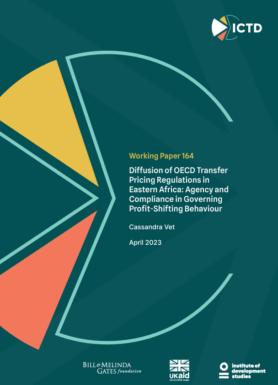Working Paper 164
Eastern African countries have codified transfer pricing regulations in their efforts to ring fence corporate tax revenue against profit shifting by multinational companies. Kenya (in 2006), Uganda (2011) and Rwanda (2020) used the dominant OECD transfer pricing guidelines as a template for reform. The wisdom of this approach for developing countries is contested in academic and civil society literature. According to this view, Western states largely dominate rule-setting procedures, and the costly enforcement of transfer pricing drains the scarce resources of revenue authorities.
How can we reconcile the critical perspective in global debates with the roll-out of OECD type transfer pricing regimes on the ground? Case study evidence collected in these countries reveals that policymakers prefer anti-avoidance measures that are widespread and considered global practice. The widespread adoption of OECD transfer pricing norms worldwide gives them a unique compatibility advantage – this allows governments to adopt them as a way to raise public revenue, without compromising their attractiveness to investors. These network externalities are among the powerful lock-in effects that have cemented the position of the OECD guidelines in global tax governance.
This study complements this narrative with a more bottom-up perspective. This highlights how domestic coalitions drive support for the OECD framework by mobilising both ideational and economic network effects. From this perspective the OECD rules are still an authoritative focal point for policymakers because interested social groups leverage concern about investor attractiveness. Ideational incentives shape bureaucratic policy advice to OECD standards. Civil society organisations, despite their critical stance towards the OECD guidelines at a global level, did not coalesce around a specific alternative – and instead raised the urgency of increasing public revenue.
